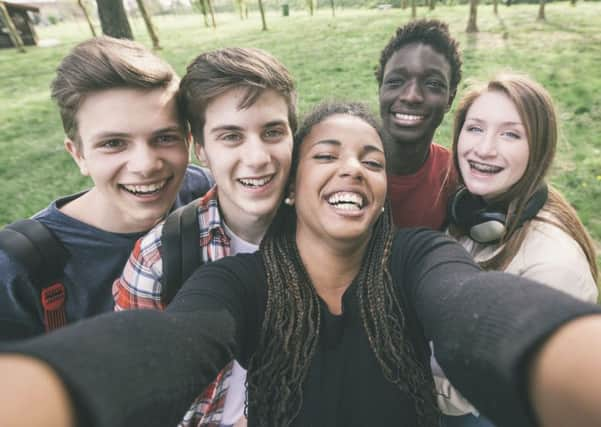Top tips for helping your kids feel more confident


Winning an Olympic gold medal has to be one of the biggest confidence boosts you can get.
But as an elite athlete, you also need plenty of confidence to start with - and Olympic champion Jessica Ennis-Hill says she gained hers from her parents.
Advertisement
Hide AdAdvertisement
Hide AdThe heptathlete, who is an ambassador for the current Sky Academy Confidence Month, says: “Nothing is more powerful than confidence.
“In my career, it was my parents who first gave me the encouragement and confidence to overcome boundaries and achieve my goals. It was then about hard work and determination to build the skills I needed to succeed.”
Underconfident Teens
Ennis-Hill, who has just won another gold medal at the World Championships in Beijing, has joined a host of other celebrities, including Davina McCall and Melvyn Bragg, to highlight the importance of confidence for young people as part of Confidence Month (from September 23).
A Sky Academy initiative which aims to build young people’s confidence to help unlock their potential, it was organised after Sky Academy research found that one in three young people aged 11-24 claim they don’t feel confident.
Confidence is lowest among 17 year olds (45 per cent), and highest in 11 year olds (73 per cent). This age group say receiving supportive feedback is a fundamental factor behind how confident they feel, with 82 per cent noting that being praised by their parents is key.
Not surprisingly, 66 per cent of girls say their confidence is influenced by how attractive they feel, compared to only 46 per cent of boys.
The findings suggest confidence peaks among pre-teens, as they have less to worry about and seek validation from parents and teachers. As they get older, young people become more worried about how they come across in front of others, leading to a confidence dip.
Fake It
But building confidence can be tricky - so where do you start? TV presenter, and fellow Sky Academy ambassador, Davina McCall, has learnt a few tricks along the way.
Advertisement
Hide AdAdvertisement
Hide Ad“I have a mantra that I always tell myself, and that is, ‘You’ve got to fake it to make it’,” she says. “If you can allow yourself to fake being and appearing confident, and that allows you to start doing a good job then, eventually, you’re going to believe it.
“From that moment, your confidence will grow and grow and you’ll know that, whatever it is, you can do it.
“If I’d known that earlier it would have helped me so much. Being able to work on my confidence and allow it to build with every show and every programme has proved to be so useful over the years.”
Beat Bullies
Ennis-Hill, who was bullied at school, gained the strength to overcome it when she recognised her athletic talents.
“Over the years, I have grown in confidence and much of this has been down to my sport - it gave me a really good sense of worth,” she admits. “The more you enjoy what you do, the more you’ll get out of it and the more you’ll feel good about yourself. Don’t put pressure on yourself at a young age.”
But she advises youngsters who still do feel under pressure: “It’s important to share lack of confidence with your parents and teachers so they can help you.”
Under Pressure
Child confidence expert Annette Du Bois says today’s young Brits are feeling more emotionally imbalanced, insecure and under-confident than ever before, leading to anxiety and unhappiness.
“The modern and complex world means emotional and psychological pressures are felt much earlier on. Trying to keep up, gain acceptance or fit in, both online and offline, can lead to a decline in wellbeing, life-skills, and social interaction.
Advertisement
Hide AdAdvertisement
Hide Ad“By learning effective techniques to build confidence, young people develop lasting self-belief to reach their full potential.”
TOP TIPS FOR BUILDING CONFIDENCE
• Create positive body language. Imagine you had lots of confidence, and think how you’d stand, sit and walk. Then ‘act as if’ you already have that confidence and stand tall, sit with self-assurance and walk with purpose.
• Deep breathing can instantly steady your emotions and give you confidence. Try placing your hands on your belly, breathe in through the nose and make the breath push the belly out slightly. Breathe out slowly through the mouth to allow the belly to return to normal. Try two to three of these breaths for a calming effect.
• People often say a lot more online than they would in person. If mean things or judgements are making you doubt your appearance or your self-belief then ignore it, and repeat to yourself: “I believe in me”.
• Appearance anxieties can make it difficult to see things as they really are. A comment, joke or constantly viewing certain images can make you feel you’re not good enough. Flick through the latest magazine (or Instagram) and pick out anything that looks perfect and see what the small print says. Has the image been changed, does it look natural? Become more aware that not everything you see is reality.
• Stand in front of a mirror and only notice positive things about your body - no negatives allowed! Focusing on your positive aspects can make a massive difference to your confidence.
• Respond, don’t react. Next time you make a mistake or things don’t go as expected, say to yourself: “Great, another chance to get it right.”
• Recognising how we communicate to ourselves (our inner chat) is the first step to making it more positive and helpful. Each morning repeat three times: “Today I choose to be positive.” Then, if at any time your negative voice creeps in, immediately replace it with its powerful positive opposite.